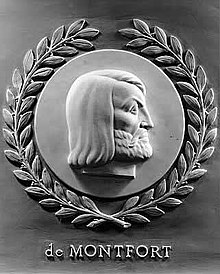De Montfort's Parliament

De Montfort's Parliament, the first representative parliament in England , is one of the most important historical achievements of early democracy in the British Isles alongside the Magna Charta . Named after Earl Simon V de Montfort , who called the meeting on December 14, 1264, the representatives met for the first time on January 20, 1265 in Westminster Hall . De Montfort's Parliament is considered to be the founding institution of today's House of Commons of the United Kingdom , the lower house of the British Parliament .
De Montfort uprising in the Second Barons' War
Because of unbalanced war strains, some English barons, including Simon de Montfort, rebelled against the English King Henry III. De Montfort, leader of a rebellious unit, was able to defeat the royal troops at the Battle of Lewes on May 14, 1264 in this Second War of the Barons and capture the king and the heir to the throne, Prince Edward . De Montfort's Parliament met primarily to deal with the release of the Crown Prince from captivity.
Historical meaning
De Montfort's Parliament initially had neither the recognition of the crown nor greater political powers, economic influence or budgetary rights. Although parliament cannot be spoken of by today's standards, the regular assembly played a crucial role in the democratic history of England.
In addition to 120 churchmen and 23 high aristocrats ( earls ), the lower land nobility and the larger cities were represented in the assembly. The composition was made up of two knights from each county (" Knights of the Shire ") and two citizens from all boroughs ("Burgesses"). Although the composition already experienced historical uniqueness, namely the participation of bourgeoisie in an English parliament, de Montfort also insisted energetically that the envoys should not be appointed, but rather elected representative.
Further development
In 1265, de Montfort put the draft parliamentary constitution he had formulated for a vote. The new democratic rules governing the composition of parliament were passed with a large majority. King Henry III however, the new parliament rejected it. After Crown Prince Eduard escaped from the supervision of the supporters of Montfort, the civil war flared up again. On August 4, 1265 the Battle of Evesham took place , which ended with a decisive victory for the king's supporters. De Montfort and most of his closest supporters were killed in the battle. To end the continuing resistance of the remaining rebels, the king proclaimed the Dictum of Kenilworth in October 1266 , and in 1267 the last rebels could finally be subdued.
In 1275, after Heinrich's death, his successor Eduard I tolerated a renewed convocation of parliament based on de Montfort's rules. Eduard thus confirmed de facto in 1275, and in 1295 under oath with the Model Parliament also de jure de Montfort's set of rules. From then on, citizens were an integral part of English parliaments. After the Wars of the Roses in the 15th century, parliament increased its self-confidence and power; likewise the number of members.
literature
- Katherine Ashe: Montfort the Founder of Parliament. Xlibris Print, 2010, ISBN 978-1-4505-7423-5 (English).
- Charles Seymour : Electoral Reform in England and Wales. Yale Univ. Press, New Haven / London / Oxford 1915, OCLC 56865121 . (Reprint: David & Charles Reprints, Newton Abbot 1970, ISBN 0-7153-4982-1 ) (English).
- The Statutes: Revised Edition, Vol. I Henry III to James II. (Printed by authority in 1876) (English).
- Reinhold Pauli : Simon von Montfort, Earl of Leicester, creator of the House of Commons. Laupp, Tübingen 1867, DNB 361276109 .
- Charles Bemont: Simon de Montfort, Comte de Leicester: Sa Vie (1207–1265), Son Role Politique en France et en Angleterre. Picard, Paris 1884, OCLC 1376051 (French).
- JR Maddicott: Simon de Montfort. Cambridge University Press, Cambridge / New York 1996, ISBN 0-521-37493-6 .
- Mandell Creighton: Life of Simon de Montfort, Earl of Leicester. Rivingtons, London 1876, OCLC 753260347 (Reprint: Adamant Media, 2001).
- Norbert Achterberg : Parliamentary Law. 1984, ISBN 3-16-644769-5 , mainly 1st chapter.
Web links
credentials
- ^ The Annals of London: a Year-by-Year Record of a Thousand Years of History. University of California Press, 2000, ISBN 0-520-22795-6 , p. 34.
- ↑ See Norbert Achterberg: Parliamentary Law. 1984, ISBN 3-16-644769-5 , p. 17.